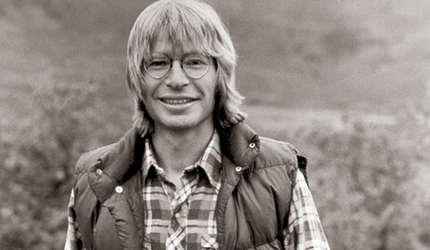Covered In Folk: George Jones
(James Taylor, Bonnie ‘Prince’ Billy, The Proclaimers & more!)

The threads that entwine early country music and American folk music are clear and bright in the folkways. Early country came from folk, coupled with other Southern strands that would lead to the blues; before the folk-revival canonization of radio and festival genres in the 50s and 60s, the folk community welcomed country artists as their own.
But although it is common for modern folk musicians to pay tribute to the early blues and country songs of depression-era radio and the early Grand Ole Opry, and to certain subgenres such as outlaw country, outside of a smaller subsection of folk artists playing on the periphery where swing, honky-tonk, and bluegrass elements are second nature, they don’t always acknowledge their debt to the Nashville strains of modern country music, even in those subgenres which arose simultaneous with the revival movements.
Enter George Jones, a Texan by birth who found voice in the be-suited Nashville crowd in the late fifties, and never left, even as country began to branch out into country rock, outlaw county, and rockabilly forms. With an identity closely tied to his alcoholism, a hard-livin’ attitude which caused him to miss no small share of his own shows, a penchant for overspending and lawn tractor accidents, and four wives – including a stormy “country couple” pairing with country icon Tammy Wynette at the height of his career which produced at least one seminal album – Jones lived the country life, and the way he channeled this life into music was duly celebrated in the sixties, seventies, and eighties by peers and critics who saw him pour heart and soul, hardship and struggle into his music as he did that daily life.
Jones identified himself as having been pushed aside in the nineties by a move towards younger, more pop-influenced artists, and record sales alone tell us his read is accurate. But there was nothing personal in this shift. Although Jones primarily performed on acoustic guitar, both his generational perspective and the country band-driven and orchestrated elements he favored in his recordings placed him squarely in the same camp as other true-blue Nashville-era artists of his time and place, from Johnny Paycheck to Charlie Daniels, and their audience aged with them as the world changed.
But the emotional core of his songwriting resonates nonetheless. And that inimitable voice – sad and pensive, soulful and sweet – continues to be as recognized and recognizable as the songs he wrote and interpreted, many of which have become true-blue staples of the honky tonk jukebox.
Fittingly, when Jones passed last week at 81, it was primarily those artists who had been most directly influenced by him in the country world – both of his own generation, and relative newcomers such as Alan Jackson, Vince Gill, and Randy Travis – who stood at the forefront of tribute, recognizing their debt even as their presence acknowledges the shift in county over time. Still, with over 150 hit records in an alcohol-fueled lifetime of touring and recording, and a knack for getting to the plain-spoken heart of the sorrow and pain inherent in the human condition, even as the world moved on, it was almost inevitable that a few of Jones’ songs – both those which he wrote, and those which he made his own – would find their way into the hands of others outside of the genre.
Today, then, we explore just a few songs from that vast periphery where the genres blur, and folk meets country, in tribute to a seminal songwriter and performer whose voice and vices were hallmarks of a bygone era. From twang to stomp, from slight to sure, from folkies-gone-country to delicate singer-songwriter and indiefolk, the breadth of coverage alone offers ample evidence for a life well interpreted. Listen individually, or download the whole set as a zip file for a tribute set that’s as country as we get.
- Elvis Costello: I Still Miss Someone / The Last Town I Painted (orig. Johnny Cash / George Jones) [2002]
Like what you hear? Always ad-free and artist-friendly, Cover Lay Down shares new songsets and ethnographic musings bi-weekly thanks to the kind support of readers like you. Here’s how to do your part:
- Support the continued creation of music by purchasing artists’ work whenever possible.
- Spread the word to friends and family by joining our Facebook page and clicking “like” on a favorite post.
- Share the wealth by sending us your own coverfolk finds and recordings.
- Donate to Cover Lay Down to help defray server and bandwidth costs.


